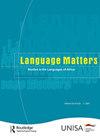马比亚语中委婉语的避讳策略探析
IF 0.8
3区 文学
0 LANGUAGE & LINGUISTICS
引用次数: 0
摘要
摘要本文研究了达格巴尼语、Farefare语(又称Gurenε语)和Kusaal语三种马比亚语中委婉语在缓和禁忌语中的使用。在马比亚人的日常交往中,他们避免使用某些表达,这些表达在大多数情况下是不可提及的。这些表达包括蛇和蛇咬,性交和生殖器,以及死亡。在马比亚社会,提及这些表达的明确术语是威胁颜面的,并可能招致各种形式的负面社会后果。因此,说话者不使用这些禁忌表达,而是使用委婉语作为禁忌规避策略;这些委婉语有助于社会凝聚力,反映了说话人的交际能力。本研究使用的数据主要来自第一手资料。然而,我们从N. A. Salifu(2012)的博士论文中提取了一些二手资料,对Dagbani的一些原始数据进行了扩充。我们运用礼貌理论和交际民族学作为分析视角。关键词:马比亚语;社会凝聚力;威胁脸行为本文章由计算机程序翻译,如有差异,请以英文原文为准。
Exploring Euphemisms as Taboo Avoidance Strategies in the Mabia Languages
AbstractThis article investigates the use of euphemisms in mitigating prohibited expressions in three Mabia (Gur) languages: Dagbani, Farefare (also known as Gurenε) and Kusaal. In the daily interactions of the Mabia people, they avoid using certain expressions, which are unmentionable in most contexts. These include the expressions for snakes and snakebite, sexual intercourse and genitalia, and death. The mention of the explicit terms for these expressions is face-threatening in Mabia society and can incur various forms of negative social consequences. Thus, instead of using these taboo expressions, speakers employ euphemisms as taboo-avoidance strategies; these euphemistic expressions oil social cohesion and indicate speakers’ communicative competence. The data used in this study were mainly gathered from primary sources. However, we augmented some of the primary data of Dagbani with some secondary sources drawn from N. A. Salifu's (2012) PhD thesis. We employ politeness theory and ethnography of communication as analytical lenses.Keywords: Mabia languagessocial cohesionface-threatening actspositive faceunmentionablepoliteness
求助全文
通过发布文献求助,成功后即可免费获取论文全文。
去求助
来源期刊

Language Matters
Multiple-
CiteScore
1.20
自引率
0.00%
发文量
19
期刊介绍:
The purpose of Language Matters is to provide a journal of international standing with a unique African flavour focusing on multilingualism in Africa. Although the journal contributes to the language debate on all African languages, sub-Saharan Africa and issues related to multilingualism in the southern African context are the journal’s specific domains. The journal seeks to promote the dissemination of ideas, points of view, teaching strategies and research on different aspects of African languages, providing a forum for discussion on the whole spectrum of language usage and debate in Africa. The journal endorses a multidisciplinary approach to the study of language and welcomes contributions not only from sociolinguists, psycholinguists and the like, but also from educationalists, language practitioners, computer analysts, engineers or scholars with a genuine interest in and contribution to the study of language. All contributions are critically reviewed by at least two referees. Although the general focus remains on multilingualism and related issues, one of the three issues of Language Matters published each year is a special thematic edition on Language Politics in Africa. These special issues embrace a wide spectrum of language matters of current relevance in Southern Africa.
 求助内容:
求助内容: 应助结果提醒方式:
应助结果提醒方式:


